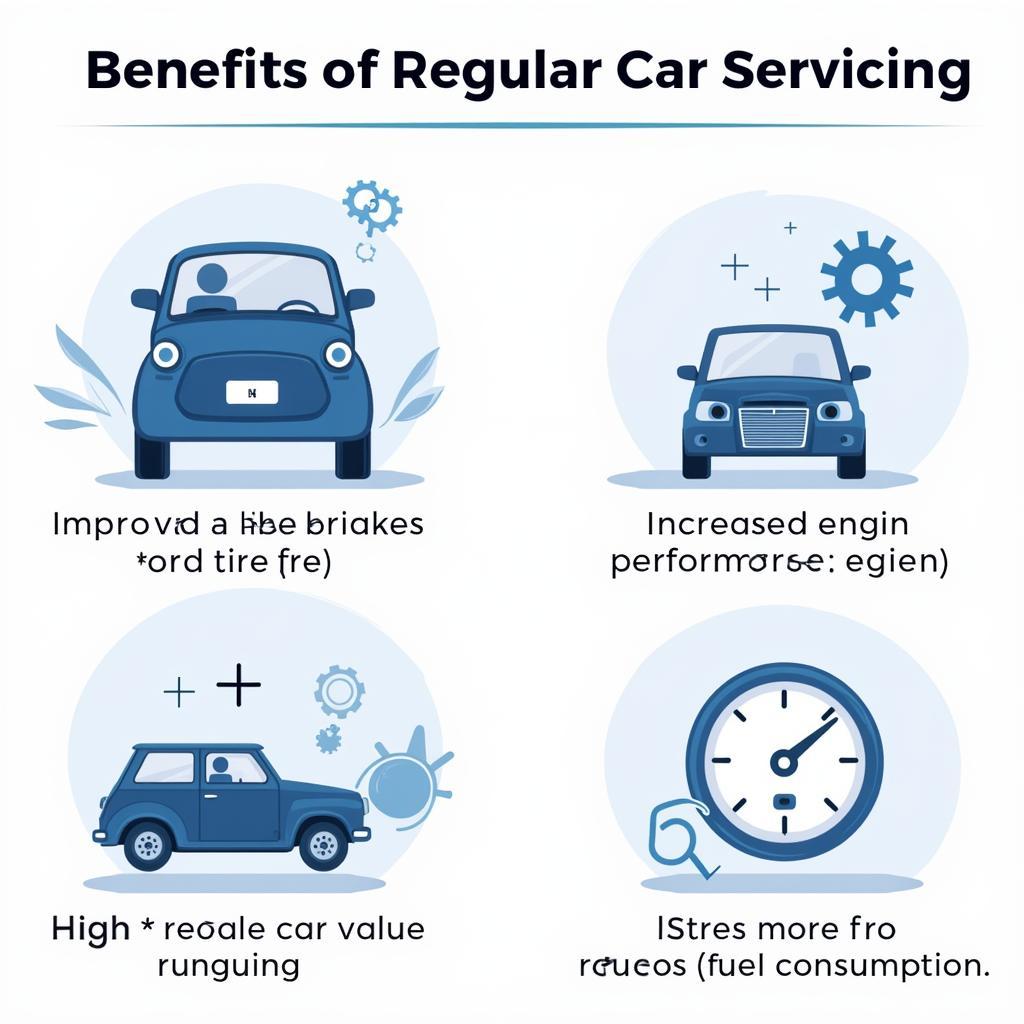Regular car servicing is crucial for maintaining your vehicle’s performance, safety, and longevity. Neglecting routine maintenance can lead to costly repairs down the line and even compromise your safety on the road. In this article, we’ll explore the key reasons why consistent car servicing is so important.
The Benefits of Regular Car Servicing
Regular maintenance, like those detailed on why cars must be serviced at intervals, helps identify potential problems before they escalate into major issues. Just like regular checkups with your doctor, preventive car maintenance can save you money and hassle in the long run.
- Improved Safety: Regular servicing ensures all safety-critical components, like brakes and steering, are functioning correctly, minimizing the risk of accidents.
- Enhanced Performance: A well-maintained car performs better, offering smoother handling, better fuel efficiency, and optimal engine power.
- Increased Resale Value: A full service history demonstrates responsible ownership and can significantly increase the resale value of your vehicle.
- Extended Lifespan: Routine maintenance helps prevent premature wear and tear on your car’s components, extending its lifespan considerably.
- Reduced Fuel Consumption: Properly maintained engines run more efficiently, leading to lower fuel costs.
- Prevent Costly Repairs: Addressing minor issues early on can prevent them from developing into expensive repairs later.
Why Is Regular Car Servicing Important for Safety?
Regular servicing is paramount for road safety. Worn brakes, faulty steering, or bald tires can drastically increase the risk of accidents. During a service, mechanics inspect these crucial safety components and replace them if necessary, ensuring your car is safe to drive. Does your car even need servicing? Find out at does my car need servicing.
What do they check during a service?
During a car service, technicians perform a series of checks and replacements based on your car’s mileage and manufacturer recommendations. This might include checking fluid levels, replacing filters, inspecting brakes and tires, and conducting diagnostic tests. You can learn more about these checks at what do they check when servicing a car.
How Often Should You Service Your Car?
The frequency of car servicing depends on several factors, including your car’s make and model, your driving habits, and the manufacturer’s recommendations. As a general rule, most cars require servicing every 12 months or every 12,000 miles. If you’re unsure about the specific service intervals for your car, consult your owner’s manual. Are you in New Zealand and wondering about car servicing intervals? Visit how often should you service your car nz.
Does my car need a full service every year?
Not necessarily. While an annual service is generally recommended, the type of service required may vary. Some years, a full service might be necessary, while other years, a basic service may suffice. Learn more about this at does my car need a full service every year.
Conclusion
Regular car servicing is an essential investment for any car owner. It ensures your vehicle remains safe, reliable, and performs at its best, while also saving you money on costly repairs and extending its lifespan. By prioritizing regular maintenance, you’re contributing to a safer driving experience for yourself and others on the road. Remember, why is regular car servicing important? Because it safeguards your investment and ensures a smooth, reliable, and safe driving experience for years to come.
FAQs
- What is included in a basic car service?
- How much does a car service typically cost?
- Can I service my car myself?
- What are the signs my car needs servicing?
- What is the difference between a full service and an interim service?
- How do I find a reputable car service center?
- What should I ask my mechanic during a service?
Common Car Servicing Scenarios
- Scenario 1: Strange noises coming from the engine.
- Scenario 2: Car pulling to one side while driving.
- Scenario 3: Warning lights illuminated on the dashboard.
- Scenario 4: Decreased fuel efficiency.
- Scenario 5: Difficulty starting the car.
Further Reading
For more information on car maintenance and repair, please visit our website for articles on specific car makes and models, troubleshooting guides, and expert advice.
Need assistance? Contact us via WhatsApp: +1(641)206-8880, Email: [email protected] or visit us at 456 Oak Avenue, Miami, FL 33101, USA. We have a 24/7 customer service team ready to help.



